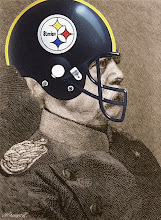This morning, 19 June, Jon Stewart was on FOX News Sunday with Chris Wallace. I was struck by how little they understood each other. Repeatedly (Stewart especially), asked, do you get me now. Remarkably, they didn’t “get” each other, despite their sincere efforts. Like most Democrats and Republicans, Stewart and Wallace don’t understand that both sides have the same concerns. Both sides are concerned about the economy, health care, education, and the family. The difference between the two is that they have different ideas on what they believe will help or improve those various issues.
Stewart talked about an organized right-wing conspiracy and Wallace talked about liberal bias in the media. Neither of them “get it” or understand that they are dealing with a set of beliefs and ideologies formulated by the Democratic National Committee or Republican National Committee. There is no conspiracy so much as a standardization of beliefs manufactured by the DNC and RNC – the default spokes-vehicles for liberals and conservatives in this country.
This brings up the issue of standardized beliefs. In Europe, Parliamentary politics is based on extreme party discipline. Politicians who don’t tow the party line are stricken from candidate’s lists and can’t get elected. In the 1980s, President Ronald Reagan relaxed party discipline to broaden the appeal of the Republicans and win new voters. Then, in 1998, at the impetus of Moveon.org, the Democrats increased party discipline in order to clarify their ideas. The Republicans then followed suit. Thus, our parties have adopted, to a large extent, European parliamentary party discipline. This discipline is strong in both parties because they both have the same over-riding goal, quite apart from the economy, health care, education, or the family.
Despite their differences, the DNC and RNC now share the same primary goal – win election or seek re-election of their candidates. Our political leaders aren’t focused on serving their constituents so much as they are focused on supporting their parties. The reality of the current situation in American politics is that they can’t afford to focus on their constituents when they must focus on the interests of the party to remain in office. Our representatives rely on their respective national committees to convince their voters that their work in Washington is serving the interests of “the people.” And, if not, they argue that it’s the fault of the other party.
Ideology replaced independent thought. Now, propaganda has replaced ideology. Maybe that’s why Stewart and Wallace couldn’t “get” each other. Maybe that’s why we get the government we deserve – a government increasingly run by unelected bureaucrats.
Subscribe to:
Post Comments (Atom)

1 comment:
On the whole, I quite agree, though an examination of foreign policy shows that Republicans are more likely to support a Democrat President when they believe his policies help the country than Democrats are willing to help a Republican President. For the first three years of the Obama Administration, Republicans have reliably supported this President on Afghanistan, while Democrats were by and large opposed to President Bush across the board. I agree that both parties often emphasize the good of the party, but I think this is more true of Democrats than Republicans. It was George W. bush, after all, who expended a great deal of capital trying to reform Social Security, knowing that the Democrats would demagogue the issue; I find little willingness for the Democrats to do the same. And something similar has happened with deficit reduction--the Republicans, with the help of Paul Ryan, have actually proposed a plan, which Charles Krauthammer has called a suicide pact for the GOP, while the Democrats have offered nothing constructive. So, yes, both sides are at fault, but Democrats more than Republicans.
Post a Comment